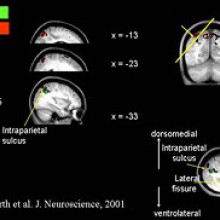Department of Experimental Psychology

Relevant Links
Psychology at Oxford is essentially a scientific discipline, involving the rigorous formulation and testing of ideas. It works through experiments and systematic observation rather than introspection.
The Oxford Experimental Psychology Department is widely regarded as one of the leading psychology departments in the UK. The department’s size and its commitment to research, as well as to excellence in teaching, means there are typically four or five research seminars each week, in addition to undergraduate lectures and classes. At present, there are particularly strong research groups in the fields of human cognitive processes, neuroscience, vision, developmental and social psychology.
| # | Episode Title | Description | People | Date | |
|---|---|---|---|---|---|
| 28 | Understanding and managing troubling mental images | Troubling mental images, such as bad memories, fearful ‘flashforwards’ and negative images of the self can impact our mental health and sense of self. | Hannah Murray, Cathy Creswell | 11 Jul 2022 | |
| 27 | Obsessive Compulsive Disorder – too careful, too nice, and trying too hard | In this practical, myth-busting webinar for staff and students, Paul Salkovskis from the Department of Experimental Psychology explains how OCD works and what needs to happen to overcome it. A Q&A follows, chaired by Cathy Creswell. | Paul Salkovskis, Cathy Creswell | 18 Feb 2022 | |
| 26 | Coping with grief after a bereavement | In this practical, myth-busting webinar, Department of Experimental Psychology researcher Dr Kirsten Smith discusses the processes that can block the natural resolution of grief as well as some evidence-based suggestions for managing them. | Kirsten Smith, Cathy Creswell | 25 Jan 2022 | |
| 25 | Bullying and Anxiety | Eleanor Leigh with panellists Lucy Bowes and Robert Hepach (chaired by Cathy Creswell) give a seminar on bullying and anxiety on Thursday 3rd June 2021. | Eleanor Leigh, Lucy Bowes, Robert Hepach, Cathy Creswell | 07 Jun 2021 | |
| 24 | Overcoming Mistrust and Paranoia | Talk and panel discussion with Daniel Freeman and panel members Elizabeth Tunbridge and Kam Bhui. Introduced by Professor Cathy Creswell. | Daniel Freeman, Elizabeth Tunbridge, Kam Bhui, Cathy Creswell | 24 May 2021 | |
| 23 | Understanding and Managing Eating Disorders | This webinar provides useful information about eating disorders and breaks down common myths. Evidence-based treatments will be provided and as well as guidance on what you can do if you, or someone you know, is struggling with eating problems. | Rebecca Murphy, Robin Murphy, Deborah Waller, Cathy Creswell | 12 May 2021 | |
| 22 | Coping with Trauma | Most of us will experience a traumatic event at some point in our lives. Our sense of self and the world may change and we may experience unwanted distressing memories and feel a wide range of negative emotions. | Anke Ehlers, Mina Fazel, Morten Kringelbach, Cathy Creswell) | 12 May 2021 | |
| 21 | Managing Depression and Low Mood | Sadness and low mood are normal parts of human experience. But what happens when they become more pervasive and disabling? | Willem Kuyken, Catherine Harmer, Andrea Cipriani. | 24 Nov 2020 | |
| 20 | Overcoming Sleep Problems | What sleep is for, how does it work and how can we deal with tricky sleep problems? This is the second talk in the Department of Experimental Psychology’s Our Mental Wellness series. | Colin Espie, Felicity Waite, Dimitri Gavriloff, Catharine Creswell | 10 Nov 2020 | |
| 19 | Managing Stress and Overcoming Anxiety | Managing Stress and Overcoming Anxiety is the first talk in the Department of Experimental Psychology’s Our Mental Wellness Series. Associate Professor Jennifer Wild explores how certain people overcome enormous stress while others struggle. | Jennifer Wild, Catharine Creswell, Robin Dunbar, Polly Waite | 08 Jun 2020 | |
| 18 | More than meet the eye: Hyperspectral imaging | How many colours we see is limited by our eye, which contains only three types of colour sensors. Using advanced techniques, vision scientists can take images of this “invisible” information and make it visible. | Sérgio Nascimento | 06 Nov 2018 | |
| 17 | Neurons code the colour we see | All activity in your brain – including those which mediates your perception of colour – is based on electrical messages between neurons. Vision scientists can measure these signals at the eye, and at the back of the brain. | Neil Parry | 06 Nov 2018 | |
| 16 | Seeing neurons inside the living eye | Using techniques borrowed from astronomy, vision scientists can take high-resolution images of the retina, the fine layer of cells in the back of your eye. | Hannah Smithson, Laura Young | 06 Nov 2018 | |
| 15 | Panel discussion: #TheDress – What do we know? | In early 2015, an image of a dress polarised the internet: Some people saw it as black-blue, and some as white-gold. Three years on, we revisit the dress and discuss how vision science can explain this phenomenon. | Manuel Spitschan, Anya Hurlbert, Karl Gegenfurtner, David Brainard | 06 Nov 2018 | |
| 14 | Developing and disseminating effective psychological therapies for anxiety disorders: science, policy and economics. | David M Clark (Oxford University) delivers a lecture at the third Calleva Research Symposium on Evolution and Human Science on 27 October 2012. | David M Clark | 04 Dec 2012 | |
| 13 | A social neuroscience perspective on adolescent risk-taking | Laurence Steinberg (Temple University) delivers a lecture at the third Calleva Research Symposium on Evolution and Human Science on 27 October 2012. | Laurence Steinberg | 04 Dec 2012 | |
| 12 | Social networks and evolution | Nicholas Christakis (Harvard University) delivers a lecture at the third Calleva Research Symposium on Evolution and Human Science on 27 October 2012. | Nicholas Christakis | 04 Dec 2012 | |
| 11 | Creative Commons | Guided Meditation | Professor Mark Williams offers a brief guided meditation in the last of four short videos in this series. | Mark Williams | 06 Dec 2011 |
| 10 | Creative Commons | Supporting Mindfulness | Professor Mark Williams explains how you can support the work of the Oxford Mindfulness Centre in the third of four short videos. | Mark Williams | 06 Dec 2011 |
| 9 | Creative Commons | The Science of Mindfulness | Professor Mark Williams examines the neuroscience of mindfulness in the second of four short videos. | Mark Williams | 06 Dec 2011 |
| 8 | Creative Commons | Introduction to Mindfulness | Professor Mark Williams introduces Mindfulness in the first of four short videos in this series. | Mark Williams | 06 Dec 2011 |
| 7 | Creative Commons | Mindfulness and the brain | In this final episode Professor Mark Williams and Danny Penman discuss how imaging studies show that Mindfulness may have numerous profoundly positive effects on the brain. | Mark Williams, Danny Penman | 05 Dec 2011 |
| 6 | Creative Commons | Mindfulness-Based Cognitive Therapy on trial | Mindfulness-Based Cognitive Therapy (MBCT) is especially good for people who have suffered the most debilitating forms of depression. The evidence for its effectiveness is overwhelming and continues to grow. | Mark Williams, Danny Penman | 28 Nov 2011 |
| 5 | Creative Commons | Mindfulness-Based Cognitive Therapy: A new approach to treating depression | Mindfulness therapy is an extremely effective treatment preventing relapse in depression. But what does it entail and how does it work? | Mark Williams, Danny Penman | 14 Nov 2011 |
| 4 | Creative Commons | Can treatments such as Cognitive Therapy help? | Depression tends to return even if it has been successfully treated. Scientists now understand why this happens and have developed therapies that reduce the risks of relapse and help lift the burden of depression should it return. | Mark Williams, Danny Penman | 07 Nov 2011 |
| 3 | Creative Commons | How is depression treated? | Doctors and psychiatrists once believed that patterns of thinking played little or no role in depression, but this is now known to be wrong. Professor Williams and Dr Danny Penman discuss how the treatment of depression has evolved in recent years. | Mark Williams, Danny Penman | 21 Oct 2011 |
| 2 | Creative Commons | What is depression? | Depression is expected to impose the second biggest health burden globally by 2020; greater even than heart disease, arthritis and many forms of cancer. Professor Mark Williams and Dr Danny Penman discuss the driving forces behind this startling trend. | Mark Williams, Danny Penman | 21 Oct 2011 |
| 1 | Creative Commons | History of Oxford's Experimental Psychology Department | Professors Oliver Braddick and Larry Weiskrantz give a talk on the history of Oxford University's Experimental Psychology Department as part the department's 113th anniversary. | Larry Weiskrantz, Oliver Braddick | 13 Jul 2011 |




